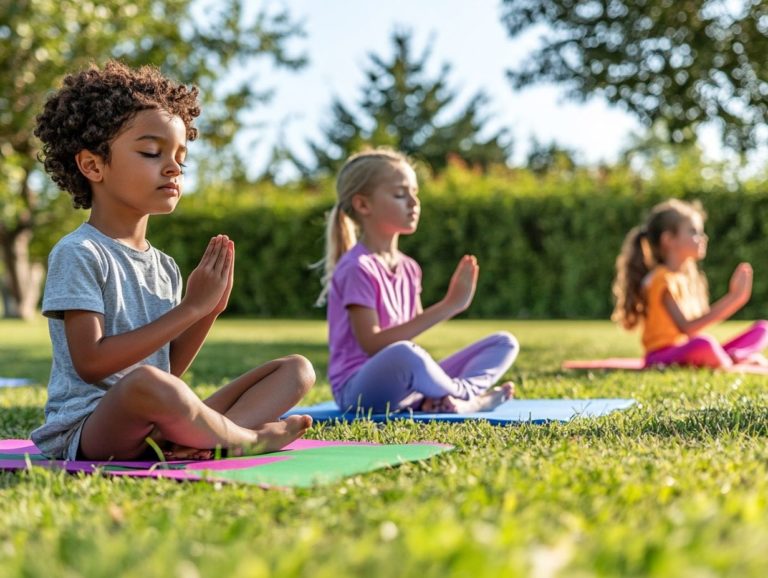The Science Behind Mindfulness and Parenting
Contents
- Mindfulness and Parenting
- Mindfulness and Parenting
- How Can Mindfulness Be Applied To Parenting?
- What Does The Science Say About Mindful Parenting?
- How Can Parents Incorporate Mindfulness Into Their Daily Routine?
- What Are Some Common Misconceptions About Mindful Parenting?
- How Can Mindful Parenting Benefit The Whole Family?
- Resources for Mindful Parenting
- Frequently Asked Questions
- What is the science behind mindfulness and parenting?
- How Does Mindfulness Impact Parenting?
- Can Mindfulness Help with the Challenges of Parenting?
- Is Mindfulness Beneficial for Both Parents and Children?
- What Are Some Simple Mindfulness Techniques for Parents?
- How Can Mindfulness Improve the Parent-Child Relationship?
Mindfulness and Parenting
In a fast-paced world teeming with distractions, practicing mindfulness becomes not just beneficial but essential for enhancing your psychological well-being and mental health.
This article delves into the rich concept of mindfulness, tracing its evolution and core principles. We will focus particularly on its application in parenting. You ll uncover the myriad benefits of mindful parenting, exploring how it can revolutionize family dynamics and examining the latest scientific insights into its profound impact on children’s development and parenting behaviors.
Get ready for practical tips that will seamlessly integrate mindfulness into your daily routine. Join in as we unravel the transformative potential that mindfulness holds for both you as a parent and your children, fostering a deeper connection and more harmonious family life.
Key Takeaways:

- Mindfulness is a practice that involves being present and aware in the moment, without judgment.
- Integrating mindfulness into parenting can lead to improved parent-child relationships, reduced parenting stress, and better overall psychological outcomes for both parents and children.
- Research has shown that mindful parenting can positively impact children’s development and overall well-being.
What Is Mindfulness?
Mindfulness is a transformative mental practice that invites you to cultivate focused attention and a rich awareness of the present moment. It encourages accepting your thoughts and feelings without judging them, along with a rich awareness of the world around you.
Over the years, this technique has evolved and found its place in diverse fields, including psychology, education, and parenting. By nurturing emotional awareness and providing a space for observing your feelings, mindfulness becomes an invaluable tool for enhancing mental health and significantly improving your overall well-being and self-worth.
How Has Mindfulness Evolved Over Time?
The evolution of mindfulness has its roots in ancient practices, particularly Buddhism, and has gracefully transformed into contemporary mindfulness-based interventions that emphasize therapeutic functions like stress reduction and emotional regulation.
This historical journey embodies a rich blend of spiritual wisdom and modern psychological insights. Initially grounded in meditation and awareness techniques, mindfulness has been tailored over the years to suit diverse therapeutic contexts. A prime example of this is Mindfulness-Based Stress Reduction (MBSR), developed by Jon Kabat-Zinn in the late 1970s. This innovative approach illustrates how ancient practices can be synthesized into effective psychological interventions.
Research consistently shows that MBSR can significantly reduce anxiety and depression while enhancing emotional well-being. A meta-analysis of various studies validates these findings.
Numerous studies validate its effectiveness, demonstrating how the integration of mindfulness practices can yield positive outcomes across a variety of populations. In doing so, it bridges the gap between ancient philosophies and modern therapeutic practices, offering a pathway to greater mental and emotional health.
We invite you to share your mindfulness experiences or tips in the comments below, as we build a supportive community focused on enhancing family life together.
Mindfulness and Parenting
What Are The Core Principles Of Mindfulness?
The core principles of mindfulness revolve around present moment awareness, non-judgmental acceptance, and the application of mindfulness in your daily life. These principles can profoundly influence your emotional regulation and self-compassion, fostering compassion for yourself and others.
By nurturing present moment awareness, you can learn to concentrate on your thoughts, feelings, and sensations without becoming overwhelmed. This practice fosters a deeper understanding of your emotional responses and helps you make healthier decisions.
Non-judgmental acceptance is key to developing a compassionate attitude toward yourself and others. It helps to diminish feelings of guilt or shame. Engaging in practices like loving-kindness meditation can significantly enhance your self-acceptance and empathy in relationships, thereby improving your parenting interactions.
When you integrate mindfulness into everyday activities like savoring each bite during a meal or being fully present during a walk you transform routine tasks into opportunities for awareness. This reinforces a sense of connection and presence, ultimately enhancing your overall mental health and psychological well-being.
How Can Mindfulness Be Applied To Parenting?
What if you could transform your parenting journey with mindfulness? Mindful parenting is about integrating mindfulness into your parenting practices, effectively addressing parenting stress through interventions that promote emotional regulation and enhance the parent-child bond. By observing emotions without judgment, parents can better meet their children’s needs.
Embracing mindfulness can elevate your parenting practices and diminish stress levels. This ultimately leads to improved psychological well-being and self-worth for both you and your children.
What Are The Benefits Of Mindful Parenting?

You ll be amazed at how mindful parenting can transform your family life! The benefits of mindful parenting are remarkable. It enhances your emotional regulation, boosts your self-worth, and significantly reduces parenting stress all of which contribute to a healthier family dynamic.
Beyond these essential advantages, this approach enriches the communication between you and your children. It paves the way for deeper connections and greater understanding. Research highlights that when you embrace mindfulness, you can noticeably decrease reactive behaviors, fostering calmer and more constructive parenting interactions within your family.
Practicing mindful parenting sets a powerful example for your children. It nurtures their emotional intelligence and resilience. By making your own mental health a priority, you’ll likely experience lowered anxiety levels. This directly influences your children s behavior, leading to a more harmonious household and fewer developmental delays.
This holistic approach cultivates an environment where both you and your children can thrive emotionally and psychologically. Parental mindfulness facilitates better child behavior and enhances family dynamics.
How Can Mindfulness Help With Parenting Challenges?
Mindfulness can serve as a powerful tool for you as a parent. It helps you navigate the myriad challenges that come your way by encouraging emotional awareness and promoting non-judgmental acceptance of both your own feelings and those of your children. This ultimately enhances behavioral compliance during tough moments, supported by numerous research-backed strategies.
For example, when your child is throwing a tantrum, practicing mindfulness allows you to pause and take a deep breath. This brief moment of reflection enables you to observe the situation without the urge to react impulsively. You can then approach your child with greater patience and empathy, leading to a more constructive interaction and improving your overall parent-child relationship.
Mindful awareness can also elevate your daily routines like mealtime or bedtime. Transforming these moments into meaningful opportunities for connection can provide deeper insights into your child’s needs and emotions, fostering a more harmonious environment that encourages cooperation and minimizes conflict. This aligns with mindful parenting techniques.
What Does The Science Say About Mindful Parenting?
Scientific research on mindful parenting reveals a wealth of positive psychological outcomes. Systematic reviews and meta-analyses underscore the effectiveness of mindfulness-based interventions, demonstrating their ability to enhance both parenting skills and child development significantly. Mindful parenting programs are often highlighted in these reviews for their comprehensive benefits.
By embracing these practices, you can foster a nurturing environment that supports growth and well-being for both you and your child. This nurturing environment is conducive to achieving various parenting goals.
How Does Mindful Parenting Affect Children’s Development?
Mindful parenting profoundly influences your child’s development by nurturing emotional regulation and fostering essential cognitive skills, both of which are crucial for enhancing psychological outcomes during childhood. Neuropsychologists have highlighted these benefits in various studies.
Research shows that when you practice mindfulness, you become more attuned to your child’s emotional needs, which translates to better emotional regulation in them as well. For instance, a study published in the journal ‘Parenting: Science and Practice’ revealed that children with mindful parents displayed lower levels of anxiety and more effective emotional responses to stress. This underscores the importance of engaging in mindfulness in parenting challenges.
By embracing mindful parenting, you also encourage the development of social skills through modeling empathetic communication and active listening. This approach cultivates cooperative behaviors in your child, boosting their ability to form meaningful relationships and improving overall family dynamics.
Additionally, a review from ‘Developmental Psychology’ emphasized that children raised in mindful environments often exhibit enhanced cognitive abilities, such as problem-solving and decision-making, as they learn to tackle challenges with a calm and focused mindset. Such environments also show decreased developmental delays and behavior issues.
What Are The Effects Of Mindful Parenting On Parent-Child Relationships?
The impact of mindful parenting on your relationship with your child is truly transformative. It cultivates a heightened emotional awareness, enhances communication, and drastically reduces the stress of parenting, all of which contribute to healthier and more supportive family dynamics. Furthermore, mindful parenting addresses the specific parenting context and challenges you face daily.
Research shows that when you engage in mindfulness practices, you become better at recognizing and regulating your emotions. This self-awareness allows for more attuned and responsive interactions with your child. For example, a study published in the Journal of Child and Family Studies revealed that parents who practiced mindfulness experienced increased emotional intelligence. This boost not only strengthens the attachment bonds with their children but also creates a secure environment where children feel safe to express their feelings.
Embracing mindful communication patterns marked by active listening and empathy enables your child to feel understood and validated. This deeper connection significantly benefits their emotional and social development, enriching both your lives in the process.
How Can Parents Incorporate Mindfulness Into Their Daily Routine?

You can seamlessly weave mindfulness into your daily routine with simple practices that not only enhance your parenting behaviors but also promote emotional well-being.
By embracing mindfulness, you create an enriching environment that becomes an integral part of your life and your family’s.
Mindful Parenting Techniques
Some effective mindful parenting techniques you can embrace include mindful breathing, body scanning, and reflective listening. These practices not only enhance your emotional regulation but also improve the quality of your interactions with your children.
By employing these methods, you become more attuned to your own emotions and those of your children. For instance, mindful breathing involves focusing on your breath to help calm your mind. It serves as a powerful tool for managing stress, enabling you to tackle challenging situations with a calm and composed demeanor rather than reacting impulsively.
During moments of heightened conflict, body scanning can be particularly beneficial. By checking in with your physical sensations, you can ground yourself and maintain perspective. Reflective listening, on the other hand, helps build better connections between you and your child. When your child shares their feelings, mirroring back what you’ve heard shows understanding and validation, creating a safe space for open communication.
Think about practical ways to apply these techniques in your daily life, like calming down after a tantrum or navigating a tricky conversation about school stress. These techniques can truly help cultivate a nurturing and communicative home environment where both you and your children thrive.
Practicing Mindfulness With Children
Practicing mindfulness with children can encompass a variety of enriching activities, such as mindful storytelling, guided imagery, and calming breathing exercises. These activities are thoughtfully designed to enhance their emotional awareness and encourage positive behavior.
These engaging practices make mindfulness both accessible and enjoyable, helping cultivate a sense of connection and tranquility. For example, when you incorporate playful elements like nature walks, encouraging children to notice their surroundings, you transform an ordinary outing into a profoundly enriching experience.
Joining in on these activities creates a shared space where everyone can reflect and learn together. This collaborative approach nurtures familial bonds and fosters understanding and emotional resilience among family members. Ultimately, it establishes a nurturing environment that supports the well-being of everyone involved.
What Are Some Common Misconceptions About Mindful Parenting?
Common misconceptions about mindful parenting often lead you to believe that it demands an extensive time commitment or is solely advantageous for parents overwhelmed by stress.
In truth, mindful parenting is an approach that can be effortlessly woven into your daily routines, no matter how busy or pressured you may feel. This practice centers on being fully present in the moment and nurturing a deeper connection with your children, enhancing your parent-child relationship even amidst the chaos of everyday life. For more insights, explore mindfulness in parenting: a practical approach.
For example, dedicating just a few minutes each day to engage in mindful listening or expressing gratitude can transform your interactions. Rather than seeing it as an additional burden, you may discover that mindful parenting enriches your life, fostering joy and resilience even when circumstances aren’t ideal.
How Can Mindful Parenting Benefit The Whole Family?
Mindful parenting has the potential to elevate your entire family dynamic. By fostering emotional regulation and enhancing your interactions as a parent, you create a nurturing atmosphere that supports overall mental health.
This approach can lead to a more harmonious household, enriching the lives of everyone involved.
Resources for Mindful Parenting

As a parent interested in mindful parenting, you have access to an array of exceptional resources tailored just for you. Consider exploring insightful books, engaging online courses, and mindfulness-based interventions that can elevate your parenting skills and deepen your emotional awareness.
These tools are designed to empower you on your journey toward more intentional and compassionate parenting.
Frequently Asked Questions
What is the science behind mindfulness and parenting?
The science behind mindfulness and parenting refers to the research and studies that have been conducted on the effects of mindfulness practices on parents and their parenting styles.
How Does Mindfulness Impact Parenting?
Mindfulness has been shown to improve parenting in various ways, including reducing stress and anxiety, increasing emotional regulation, and enhancing communication and empathy.
Can Mindfulness Help with the Challenges of Parenting?
Yes, mindfulness can help parents better navigate the challenges of parenting by increasing their self-awareness and ability to respond instead of react to difficult situations.
Is Mindfulness Beneficial for Both Parents and Children?
Yes, mindfulness can have positive effects on both parents and their children. When parents practice mindfulness, they can better regulate their emotions and create a more peaceful and nurturing environment for their children.
What Are Some Simple Mindfulness Techniques for Parents?
Some simple mindfulness techniques for parents include deep breathing, body scan meditation, and mindful walking. These practices can help parents stay present and calm in the midst of the chaos of parenting.
How Can Mindfulness Improve the Parent-Child Relationship?
Mindfulness can improve the parent-child relationship by fostering open communication, reducing conflicts and power struggles, and instilling a sense of compassion and understanding between parent and child.






